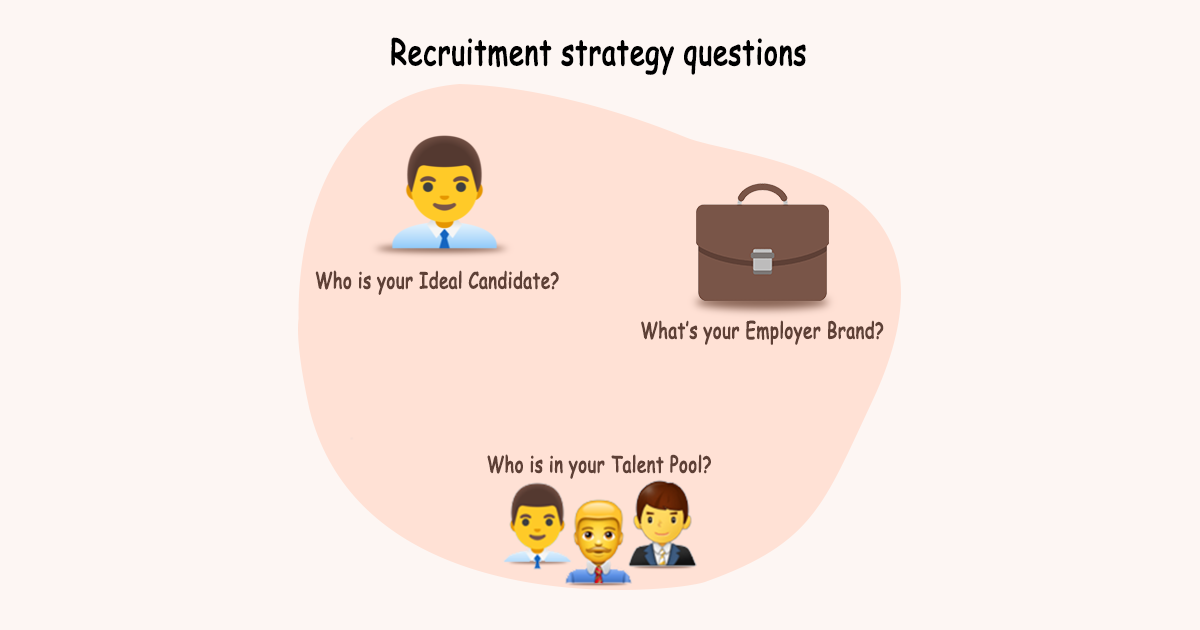Startups face numerous challenges daily, especially when you're in the early stages of your business. From running around for funding to making progress with product development, as a founder, you're constantly in the middle of one high-intensity event or another. And to compound matters further, there's an important challenge that comes one's way: Finding the right employees for their endeavor.
For startups, hiring the right candidate can often be a make-or-break decision. Upgrading their workforce with one more employee can exponentially boost their business results. At the same time, making a mistake can have a startup stand to lose a significant amount of investment.
With the stakes being this high, it’s easy to understand why many startups develop robust hiring practices to reduce the risks that come along with the territory. In this article, let's show you six of the main challenges startups face when looking to expand their personnel and how to overcome them. We hope this will give you ideas on how to create your recruitment strategy.

Challenges to hiring at early-stage startups
1: Adjusting to the growth phase
Startups have to be focused predominantly on their company's growth for most of their early stages. This takes up the majority of their team’s effort and translates into having many responsibilities that have to be taken care of.
One of the biggest challenges when looking for new team members is balancing the tasks related to the growth of the business alongside the struggles of the recruitment process. From advertising the job offer to looking at all candidates and scheduling and conducting the interviews, the process must be systematic and timely for you to be able to find the right fit.
How to solve this?
It's highly recommended that you look for avenues to lend you a helping hand for hiring processes. As an entrepreneur, there are many responsibilities on your shoulders, and it's not always feasible to prioritize hiring exercises. Looking for external support in this department can help you avoid many issues in the future.
Keep in mind that as your startup keeps growing and developing, so will your need to hire people that can help you keep up with this pace.
Hiring RPO providers (Recruitment Process Outsourcing) can be a great move since it can allow you to have the time to focus on other tasks that need your full attention.
This strategic action can also make a significant difference since RPOs will professionally analyze your business and job offer to find the right employee who fits your needs.
2: Lack of hiring experience
The main challenge entrepreneurs often face when hiring talented members for their team is likely their lack of experience in this area.
When a startup is in its early stages, it doesn’t have a long-term team that works for them or has formed the company's core. Therefore, the founder can find themselves with no idea of what to look for.
How can you know you are hiring the right employee if you don’t know what ‘right’ means for your project?
This lack of experience can also be a hindrance, competitively, versus other companies looking for talent. These companies may have an appointed HR department ready to search the market, as well as established recruitment processes. Their already-established system ensures great results when deciding on adding new team members, and you're already at a disadvantage as an early-stage startup here.
How to solve this?
A few desirable approaches to this situation include finding professional help from an RPO provider (Recruitment Process Outsourcing), which could make the recruitment process much easier and with great results. The price of this service can be pretty affordable too since many providers base their cost depending on the business type and its needs.
Another recommendation is to invest some of your time and effort in creating a recruitment strategy for your company. In fact, you will be able to rely on this strategy to hire people, even when your startup is in its growth stage.
How can you start creating this strategy? Here are the three main questions you can answer in order to guide you:
Who is your ideal candidate?
Form a specific idea of who you want to fill this position with.
Essential qualities, qualifications, previous experiences and career history, personal traits, ambitions, work ethic, etc., are great points to consider when specifying this point.
Remember, you are now creating the general idea of who would fit in the company culture you are currently building. This person will also be one of the main actors in the consecution of this idea.
What’s your Employer Brand?
An Employer Brand is the reputation a company projects as an employer. It encompasses the image and values they communicate as a business, both to their current and to their potential employees.
Glassdoor statistics show that 86% of job seekers research a company’s reputation through reviews and ratings while deciding whether to apply for a job or not.
Working on having a good Employer Brand will help you bond with candidates who share your vision and values. This will also get you closer to finding candidates that fit right into your startup's hiring plan and aid you in the development of a steady hiring line, instead of relying on just your own luck.
Who is in your talent pool?
Many companies create talent pools as tools for speeding up their hiring processes.
Your talent pool will act as a resource. Here's where you keep all the information of the candidates you considered fitting for your job descriptions at some point but weren’t selected as the final candidate.
With this information, you can come back and review the profiles you already know have some value for you whenever you have a new job opening. You can then consider them for the position without investing time in actively searching the market.
3: Avoiding premature scaling
Premature scaling occurs when your startup begins to grow at a faster rate than you or your project can keep up with.
This is a serious problem that should be avoided at all costs since—based on a study by Startup Genmos—it is the reason why 74% of startups fail.
When your business starts growing, you will require more professionals who will make it possible to keep up with the demand, while making the company evolve and grow.
However, if you don’t properly analyze the needs of your startup and the resources you have, you may end up over-hiring. This is the number one culprit that usually ends up in the premature scaling of your company.
How to solve this?
The main way to avoid this situation is to consider if it truly is necessary to hire a new member to develop that task or if it’s possible to find a different alternative at a lower cost.
Outsourcing can be a great alternative here. The exercise doesn’t involve fixed expenses, and it allows you to adapt to your needs freely as time goes by.
Another way to solve this would be by investing some of those resources in your current employees. Maybe someone on your team already can develop those tasks if given the proper tools and instructions. Look internally before you start looking for alternatives.
By considering this option, you may end up investing less capital than you would by hiring someone new. At the same time, this shows your trust in your team and their capacities, which further builds your employee brand and team morale.
4: Low opportunities for job offer exposure
A common problem faced by startups in various stages is the lack of budget for actions such as marketing and promotions. This can significantly impact the talent acquisition opportunities since only a few people will be aware of your company, and thus your job openings.
Low exposure will make it difficult to attract new talent to your company. Not only for the lack of knowledge about your existence but also because it could seem risky for candidates to join an early-stage startup with an unknown reputation.
In order to compete in this active job market, startups have to look for ways to stand out from the rest of the companies looking to hire.
How to solve this?
Several elements could play a great part in solving this issue. First, as we mentioned before, working on improving your Employer Brand is an essential move to succeed. But here are a few more options that will boost your exposure:
Look for alternative ways to expose your job offers
For example, you can use job boards specialized in your industry or for experts in a specific field of work. This way, you can advertise your offer directly to candidates similar to your candidate persona.
Startup job boards are another great option to consider since candidates on these websites actively accept the shortcomings of joining a startup. It can save you a lot of time by avoiding potential uninterested candidates.
Improve your Social Media presence
Promoting your company through social media is an affordable action that greatly impacts your visibility.
You can use these platforms for advertising your new job offers and reaching a more significant number of potential candidates while allowing them to have direct communication with you, at the same time.
Creating an EVP
EVPs, or Employee Value Propositions, are commitments you make to your employees, so they know what to expect from you as an employer. These promises constitute part of your brand and are a part of your identity as a business.
With this approach, companies can attract new talent into their pools and keep them interested in being a part of your project in the long term.
In fact, a Gartner research shows that companies that act on their EVP, potentially reduce annual employee turnover by nearly 70% while boosting new hire commitment by almost 30%.
In your EVP, you should clearly mention what makes your startup different from others, what you expect from your employees, and what benefits your employees can expect by working for you. This will help you build your Employer Brand too.
Relying on your investors
Investors can be of strategic use to you, beyond just offering to fund your endeavors. They are experts and highly experienced in a number of business creation processes and management areas, and usually have many contacts in several industries.
Ask for your investor’s help and connections to promote job offers and gain extra exposure.

5: Low budget for salaries
Another challenge startups face when hiring—and this is a pressing issue—is how the low budget can affect the salaries of their team.
One of the first things someone notices when applying for a job is the salary, and this can be a make-or-break requisite for many.
Senior Employees who are fairly experienced in their job may not be interested in finding a job in your company if this means they will get a lesser wage. That is unless the conditions of the offer are incredibly favorable in other areas.
At such an early stage, you will not be able to afford high salaries, or benefits like a company car, gym subscriptions, remote working, house allowances, etc., naturally.
How to solve this?
Sadly, the only thing you can do is lower your expectations a little bit in this department. This doesn’t mean you have to hire anyone and everyone; it only means you need to look for slightly less experienced talent, but someone still qualified enough to do the job you need them to do.
New graduates are a great option that big companies often underrate. However, hiring these fresh graduates is a great opportunity for startups that don’t have such a generous budget.
These professionals may not be seasoned enough, experience-wise. But, they offer the same qualifications and sometimes even more drive than people who have been on the job for longer.
As a small business trying to grow, having someone in your team that is so deeply invested in the project's success can be a great asset.
6: Lack of tech talent on the market
This may sound oddly specific, but finding great tech talent is a huge challenge faced by early-stage startups these days.
For the past few years, there has been a global shortage of tech professionals in the job market. Since most businesses need one of these experts in their lines at the very least, the competition to recruit a candidate with those qualifications has become much more challenging.
This increased competition for talent makes tech hiring even more difficult for startups, especially considering all the previous points that make them less desirable to candidates.
How to solve this?
Get creative with who could fulfill your needs.
Be open-minded when looking for this new team member. Maybe other profiles could achieve the same result for your startup by doing a different job. Or perhaps you could rethink your ideal candidate based on your startup’s situation and the current job market.
Another thing you can do is search for passive candidates. These people are not looking for a job actively at the moment but could be in a situation that could make them consider joining your company.
For example, people who work in a similar field may need to refine their tech skills but have other valuable qualities that could compensate for the lack of expertise. As a startup, making this investment in someone can have a great impact in the long term, both economically and in the trust formed between the employee and the employer.
Although hiring in the early stages of a startup can seem—and in many instances is—a rather hard task, companies that successfully overcome this hurdle can expect to exponentially boost their growth and achieve their goals.
We hope this article is of help in guiding you through the beginnings of this process and gets you closer to building your dream team.



